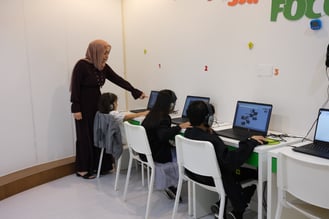What is Digital Dementia?
 Digital dementia is a term that was first coined by German neuro-scientist Manfred Spitzer. It refers to the cognitive decline experienced by individuals who excessively depend on digital devices for memory and cognitive tasks. Just like how physical inactivity leads to muscle weakness, mental inactivity—when we outsource memory and problem-solving to our devices—can impair brain functions, particularly memory and concentration.
Digital dementia is a term that was first coined by German neuro-scientist Manfred Spitzer. It refers to the cognitive decline experienced by individuals who excessively depend on digital devices for memory and cognitive tasks. Just like how physical inactivity leads to muscle weakness, mental inactivity—when we outsource memory and problem-solving to our devices—can impair brain functions, particularly memory and concentration.
People who suffer from digital dementia often exhibit symptoms typically associated with brain aging, such as poor memory, attention deficits, and reduced cognitive flexibility. The condition is especially concerning because it is increasingly affecting younger individuals, including children and teenagers who grow up in the digital world.
Causes of Digital Dementia
 The rise in digital dementia can be attributed to several factors:
The rise in digital dementia can be attributed to several factors:
-
Over-reliance on Devices: Many of us have become so accustomed to using our phones for storing phone numbers, reminders, and notes that we no longer engage our brains to memorize information. Instead of problem-solving or remembering tasks, we turn to our devices.
-
Lack of Mental Exercise: When we let our phones do the thinking for us, we are depriving our brains of the necessary mental exercise needed to keep it sharp. Activities like reading, mental math, and even simple tasks like navigating without GPS can help keep our cognitive abilities intact.
-
Multitasking: The constant influx of notifications, social media updates, and text messages can overwhelm the brain. Multitasking forces our brain to divide its focus, leading to decreased attention span and weakened memory retention.
-
Screen Time Overload: Excessive use of screens, especially in younger children, can inhibit crucial developmental processes. A child who spends too much time on digital devices may not develop the essential skills of focus, problem-solving, and creative thinking.
The Severity of Digital Dementia
 The impacts of digital dementia can be severe. For children and adolescents, overuse of digital technology can delay critical cognitive development, affecting areas such as attention, memory, problem-solving, and emotional regulation. Furthermore, it can impede the development of social skills, as children spend more time interacting with screens than with real people.
The impacts of digital dementia can be severe. For children and adolescents, overuse of digital technology can delay critical cognitive development, affecting areas such as attention, memory, problem-solving, and emotional regulation. Furthermore, it can impede the development of social skills, as children spend more time interacting with screens than with real people.
For adults, digital dementia can impair productivity, memory recall, and mental flexibility, and in extreme cases, may even contribute to conditions like anxiety and depression. Over time, this mental decline may mirror symptoms of early-stage dementia, such as forgetfulness, confusion, and an inability to concentrate for extended periods.
The Solution: Cognitive Training
Cognitive training is one of the most effective solutions to combat digital dementia. Just as physical exercise strengthens the body, mental exercises, or "brain workouts," strengthen the mind. By actively engaging the brain in challenging tasks, we can stimulate neural growth, enhance memory, and improve overall cognitive functioning.
Here’s how cognitive training can benefit both children and adults:
1. Cognitive Training for Children
In an era where screens are ubiquitous, children need deliberate opportunities to develop their cognitive abilities. Cognitive training programs can help children by focusing on key areas such as memory, attention, problem-solving, and language skills. These programs are designed to engage the child’s brain through interactive and age-appropriate exercises, such as:
- Memory games: Activities that encourage kids to memorize information, like sequences or patterns, help strengthen their working memory.
- Problem-solving tasks: Puzzle games and challenges can encourage children to think critically and make decisions.
- Attention training: Exercises that require sustained focus and concentration can improve their ability to complete tasks without distractions.
By enhancing these skills, children will develop better focus, improved academic performance, and more robust social interaction skills. At Brainbox Center for Child Development, we offer specialized programs that integrate fun and stimulating cognitive training activities to help children achieve these goals.
2. Cognitive Training for Adults
 For adults, cognitive training is equally essential in mitigating the effects of digital dementia. These programs include:
For adults, cognitive training is equally essential in mitigating the effects of digital dementia. These programs include:
- Memory exercises: Training that involves recalling lists, solving puzzles, or engaging in memory-enhancing games can prevent memory decline.
- Attention and focus drills: Exercises that challenge concentration and focus can help adults stay sharp in both their personal and professional lives.
- Problem-solving activities: Engaging in tasks that involve critical thinking, such as logic puzzles or strategy games, can help adults retain cognitive flexibility.
Practicing mindfulness, engaging in social activities, and setting time aside for creative hobbies can also support cognitive health by providing much-needed mental stimulation. Moreover, setting limits on screen time and incorporating offline activities such as reading, outdoor games, and hobbies will further contribute to maintaining brain health.
Conclusion
The rise of digital dementia serves as a wake-up call for all of us. While technology provides countless benefits, over-reliance on it can lead to cognitive decline in both children and adults. However, by integrating cognitive training exercises and consciously reducing screen time, we can combat the effects of digital dementia and preserve our brain health.
At Brainbox Center for Child Development, we believe in the power of cognitive training to support both children and adults in developing stronger mental faculties. With the right approach, we can ensure that the digital age enhances our lives without diminishing our cognitive potential.

 As the school year kicks off, the excitement of new beginnings is often coupled with the challenges of getting back into the academic groove. One of the most crucial elements in ensuring a smooth transition is cognitive training. Cognitive skills—such as memory, attention, problem-solving, and reasoning—are the foundation of academic success. When these skills are sharp, students are better equipped to absorb new information, think critically, and perform well in their studies. This is why it’s essential for parents to prioritize cognitive training as part of their child’s back-to-school preparation.
As the school year kicks off, the excitement of new beginnings is often coupled with the challenges of getting back into the academic groove. One of the most crucial elements in ensuring a smooth transition is cognitive training. Cognitive skills—such as memory, attention, problem-solving, and reasoning—are the foundation of academic success. When these skills are sharp, students are better equipped to absorb new information, think critically, and perform well in their studies. This is why it’s essential for parents to prioritize cognitive training as part of their child’s back-to-school preparation.
.jpg?width=399&height=600&name=Happy%20child%20(1).jpg) Dyslexia, a common learning disability, affects the way individuals process language, often making reading, writing, and spelling a challenge. While traditional educational approaches may provide some support, they often fall short in addressing the root cognitive issues associated with dyslexia. At Brainbox Kuwait, we believe in a different approach – one that focuses on enhancing the brain's cognitive abilities to overcome and, in many cases, eliminate the symptoms of dyslexia.
Dyslexia, a common learning disability, affects the way individuals process language, often making reading, writing, and spelling a challenge. While traditional educational approaches may provide some support, they often fall short in addressing the root cognitive issues associated with dyslexia. At Brainbox Kuwait, we believe in a different approach – one that focuses on enhancing the brain's cognitive abilities to overcome and, in many cases, eliminate the symptoms of dyslexia.
 The Benefits of Cognitive Training for Dyslexia
The Benefits of Cognitive Training for Dyslexia




 As the school year winds down, many parents seek productive and enjoyable activities to keep their children engaged during the summer months. At BrainBox, we offer a unique blend of fun and learning through our summer activities designed to boost cognitive skills and prepare children for the upcoming school year. Our summer program is not just about keeping your child busy; it's about giving them the tools they need to excel academically and socially.
As the school year winds down, many parents seek productive and enjoyable activities to keep their children engaged during the summer months. At BrainBox, we offer a unique blend of fun and learning through our summer activities designed to boost cognitive skills and prepare children for the upcoming school year. Our summer program is not just about keeping your child busy; it's about giving them the tools they need to excel academically and socially. Summer Camp
Summer Camp
 Specialized summer camps focused on cognitive development offer a unique blend of fun and learning. These camps are designed to engage children in activities that enhance their cognitive abilities while ensuring they have a great time.
Specialized summer camps focused on cognitive development offer a unique blend of fun and learning. These camps are designed to engage children in activities that enhance their cognitive abilities while ensuring they have a great time.

 Children and Adolescents: BrainBox provides exercises that target core cognitive skills such as memory, attention, and processing speed. These exercises are designed to be engaging and age-appropriate, ensuring that young learners build a strong cognitive foundation that supports academic success.
Children and Adolescents: BrainBox provides exercises that target core cognitive skills such as memory, attention, and processing speed. These exercises are designed to be engaging and age-appropriate, ensuring that young learners build a strong cognitive foundation that supports academic success.
